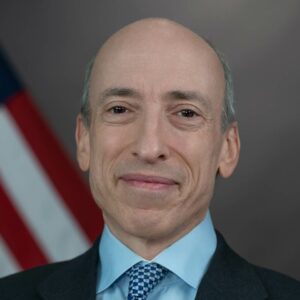They say in the movies, “This time, it’s personal.”
But when it comes to his opposition to cryptocurrency investments, with Securities and Exchange Commission (SEC) Chair Gary Gensler, it sounds personal every time.
Asked about the possibility that a federal court decision might change his anti-crypto views, Gensler laughed.
“I wish something a court would say would actually bring the compliance sooner, Gensler said, comparing the current market to the Roaring 20s before claiming “there are so many hucksters and fraudsters” in crypto.
He told a similar story to a group of lawyers last week. It was part of his justification for more broad rulemaking from the agency and explaining why the SEC made almost 800 moves against crypto. “We are not afraid to litigate matters whether against the best-resourced founders, the oldest firms, the newest industries, and yes, the largest crypto exchanges.”
As with every investment, there have been bad actors and illegal schemes. But critics say Gensler’s near-mania in opposing crypto is bad for financial markets and the U.S. economy.
“It’s undeniable that there’s plenty of fraud and grift in crypto,” Luke Hogg, Director of Outreach, Foundation for American Innovation, told DCJournal. “But if Chair Gensler continues to paint the whole industry as swindlers, bandits, and crooks, the U.S. will lose out on transformational innovations. Hopefully, Congress will…resolve these conflicts and contradictions.”
Hogg said the SEC chief’s testimony before Congress was rife with hypocrisy.
“Gensler was forced to admit that Bitcoin is not a security in the same hearing as he maintained his assertion that virtually all other crypto assets are securities,” he said. “Gensler also claimed that proactive rulemaking on crypto is unnecessary because the current rules are already clear. The reality is that courts are already rendering inconsistent case-by-case decisions due to lack of clarity.”
Gensler’s reliance on court decisions seems strange, given his track record. His federal court losses are piling up. A New York federal judge rejected Gensler’s claim that Ripple committed a securities violation by selling its XRP token. A separate federal court panel ruled weeks later that the SEC behaved unlawfully by denying Greyscale’s proposal to create a publicly traded mutual fund.
But much like Charlie Brown and the football, Gensler isn’t going to adjust his strategy.
“I don’t think that’s going to change until we get a real significant decision from the court,” said attorney and crypto advocate John E. Deaton. “I’m hoping that the Coinbase motion to dismiss in…New York…that Coinbase wins that motion because that would be the biggest check yet against the SEC’s basic overreach in this industry.”
Republican and Democratic House members have had enough of Gensler’s anti-crypto bias.
“For you, the process of tokenization is what transforms a non-security transaction into a security transaction?” Rep. Ritchie Torres (D-N.Y.) asked Gensler after wondering what the difference is between the sale of a Pokémon card versus a digital Pokémon card. “I thought you were technology-neutral?”
“I’m convinced that you are not an impartial regulator!” exclaimed Rep. Tom Emmer (R-Minn.) as he accused Gensler of looking to consolidate power. “It cannot be understated that a common theme throughout your career is your relentless loyalty to the largest financial institutions at the clear expense of innovation, competition, and everyday Americans.”
“You are acting as the chairman by proposing rulemaking after rulemaking without any regard to the impact of these rules,” said Rep. Warren Davidson (R-Ohio). “It’s having a massive impact on our markets…why would you disrupt them with processes that are driving capital out of our market?”
Gensler had no answer except saying that he wanted to “protect investors.”
Crypto advocates want Congress to do its job and pass legislation establishing clear regulation boundaries. A bipartisan bill passed the House Financial Services Committee over the summer but has failed to advance further. With the 2024 presidential election looming, it is unlikely any framework will be further developed.
“I think we’re gonna continue to see court rulings,” said Deaton. “But so far, Gensler is losing significantly in these court rulings…”


